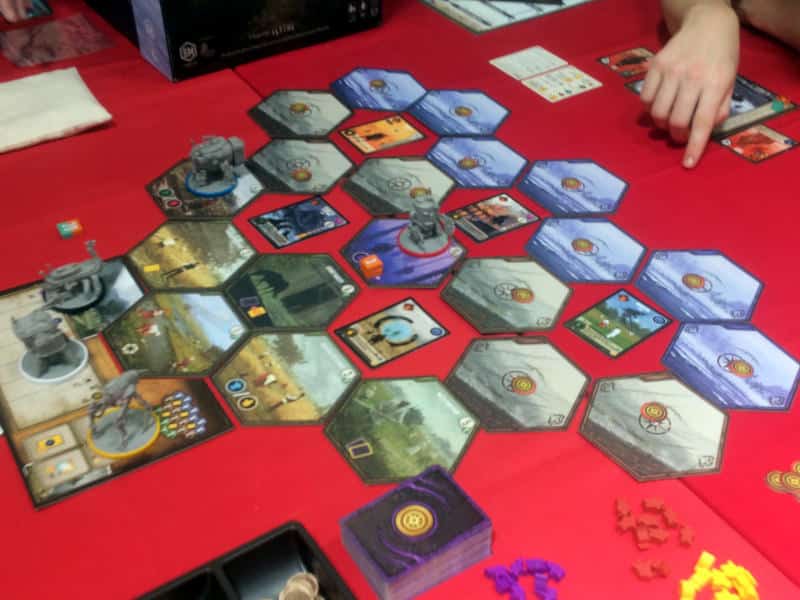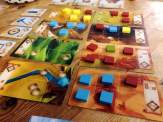Fresh off the back of demoing games for Asmodee at UK Games Expo 2023, I wanted to share my experiences with introducing people to a new game. I think demoing and teaching games are two similar, but also different approaches. In this article, I want to look at them more closely.
First of all, let me explain what I mean by demoing and teaching. Both are about allowing someone to be able to play a game with no or only very little help. However, while teaching is about giving people as complete an understanding of a game as possible, including all, or at least the large majority of, rules, demoing is much more focused on allowing someone to experience how a game feels, without necessarily learning all of the rules.
After you teach someone a game, they will be able to play it themselves, at least on the whole. They might need some rules refreshes, but in principle, they know the game now. When you demo a game, you have no expectation that people will be able to play it by themselves. They will still need to pick up the rulebook and check additional rules and read up on how to set up the game.
I hope this gives you an idea as to what I mean by the terms: demoing and teaching.
Similarities
So let’s start with what demoing and teaching have in common.
When you show someone a game that’s new to them, you always have to consider how much they know about modern hobby games and then, what sort of games they already know. If someone is very familiar with a lot of different games, they will find it a lot easier to learn a new one. There will be mechanisms and other concepts that they already know. If someone is very new to the hobby, then your approach will have to change. You have to think about what terminology will need additional explanations.
Whether you demo or teach a game, you will probably outline what the game is about and how it works, then explain some of the rules. I always think you should try and get people to play as soon as possible and only go over what’s necessary. Some people don’t like that, at least not during a teach, but I often find people forget rules anyway. So you might as well start playing and then explain the rest as you get to it.
When it comes to setting up a game, in a demo you probably have most things ready or at least mostly set up. That is also often true when it comes to teaching a game. Yet, in both cases, there are games where it makes sense to get everyone involved in setting up the game. That way, people can familiarize themselves with the components. It’s also an opportunity to tell everyone what different things are called. After all, there will be some sort of in-game terminology. Different card decks will have different functions and have different names in the game, for example.
Differences
So far, so good. Demoing and teaching are clearly quite similar in a number of ways. Now it’s time to look at how they differ. I think the key here is the expected outcome.
As I said, a demo isn’t about explaining a game fully. You just want people to get a flavour of what a game is like. Chances are, you’re only going to play a few rounds. You’re unlikely to play a complete game. So there is no need to go over all of the rules. People need to know just enough so that they can start playing. You probably still want to talk about how the game ends and how scoring works in broad strokes, but there is no need to go into detail.
When you do a full teach, on the other hand, you do want to have explained all of the rules, the end game triggers, scoring and everything else. Depending on your approach, you might not talk about everything at the start, but by the end of the game, you should have covered pretty much the whole rulebook.

Different Setup
I think the setup is also different in demos, as opposed to when teaching a game to friends or family. In a demo situation, you often skip some setup steps. Instead of shuffling decks, you might order the cards in a specific way to create a scenario that gives players a good feeling about how the game works. It’s about the experience people around the table have during the demo. You want them to go away and buy the game. You don’t expect them to know it fully.
Mind you, when you teach a game to friends and family, you might also skip some setup steps. For example, asking people to draft cards during a first play can be a bit frustrating. Nobody will know all of the symbols or have any idea of how valuable certain cards are over others. It’s sometimes easier to just randomly deal out cards, but explain that in future plays, cards would be properly drafted.
Taking Turns
Demos and teaches can also differ when it comes to taking turns. In a demo, you might get players to do specific things to start with. That helps you explain certain actions or mechanisms and also takes away the pressure from people to make decisions they don’t fully understand yet. After a certain number of rounds, players can then make their own choices, because they can now see what effect actions have. It’s unlikely you do this during a normal teach, but you might still suggest what someone might want to do on their turn. However, you don’t want to take away people’s agency.
That’s a really fine balancing act that’s especially hard in a demo. You want everyone to feel that they make their own decisions, at least for most of the time they play the demo. At the same time, you want to steer them in a certain direction, for example by setting up the game in a specific way, so that they have a good experience overall.
What About You?
I am sure there are more differences and similarities between demos and normal teaches, but I think I covered the main ones. So my question is, have you ever demoed a game? What are your tips? Do you approach a demo in the same way as when you teach a game to friends or family? As always, please share your thoughts and experiences in the comments below. I’d love to hear from you.
Keeping the blog running takes time and resources. So if you can chip in, that would be amazing.
Useful Links
- Asmodee: https://www.
asmodee. co. uk/ - UK Games Expo 2023 review: https://tabletopgamesblog.
com/ 2023/ 06/ 10/ uk-games-expo-2023-saturday-review/
Audio Version
Intro Music: Bomber (Sting) by Riot (https://www.
The following music was used for this media project:
Music: Afternoon by DreamHeaven
Free download: https://filmmusic.io/song/6242-afternoon
License (CC BY 4.0): https://filmmusic.io/standard-license
Artist website: https://www.patreon.com/dreamheaven






